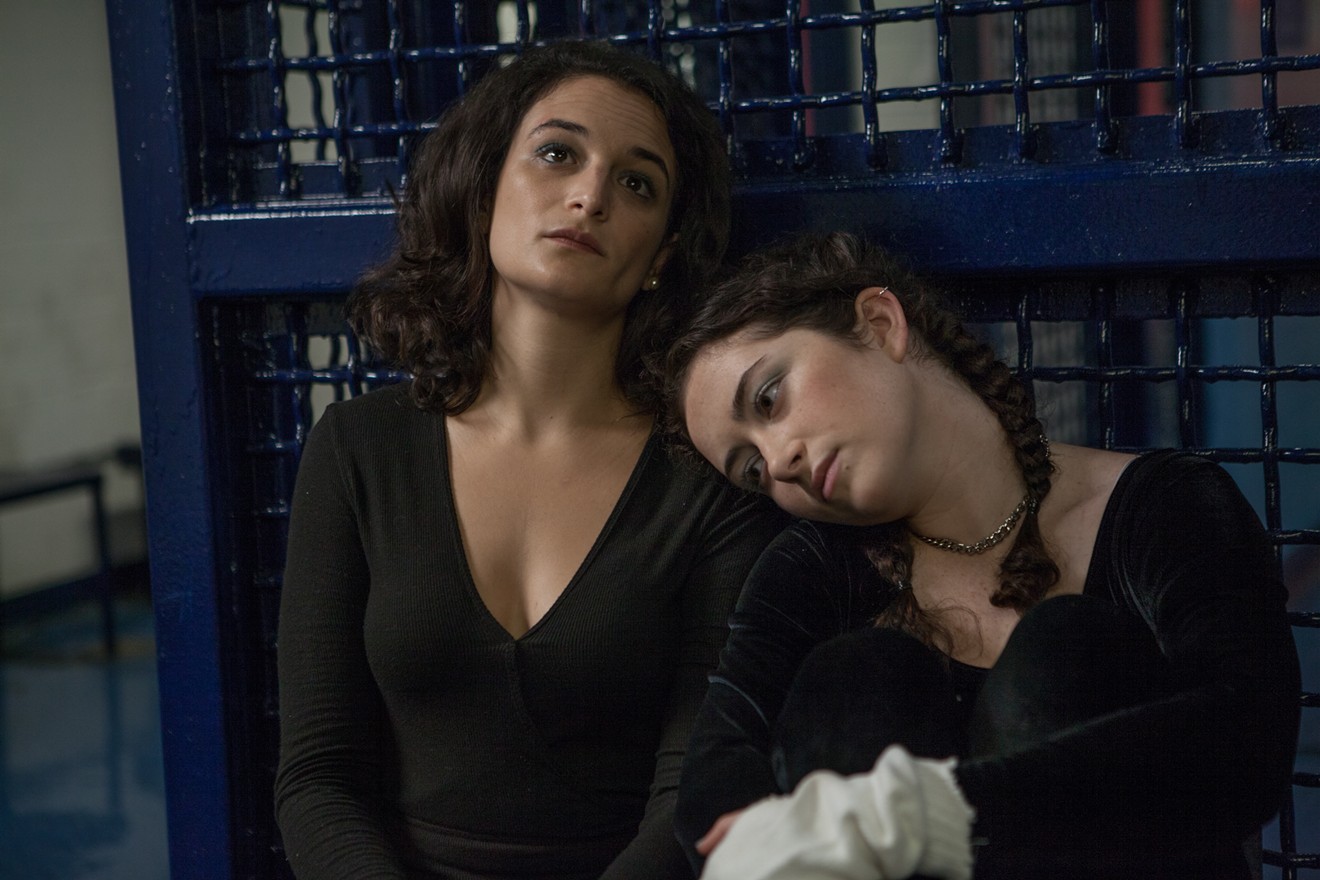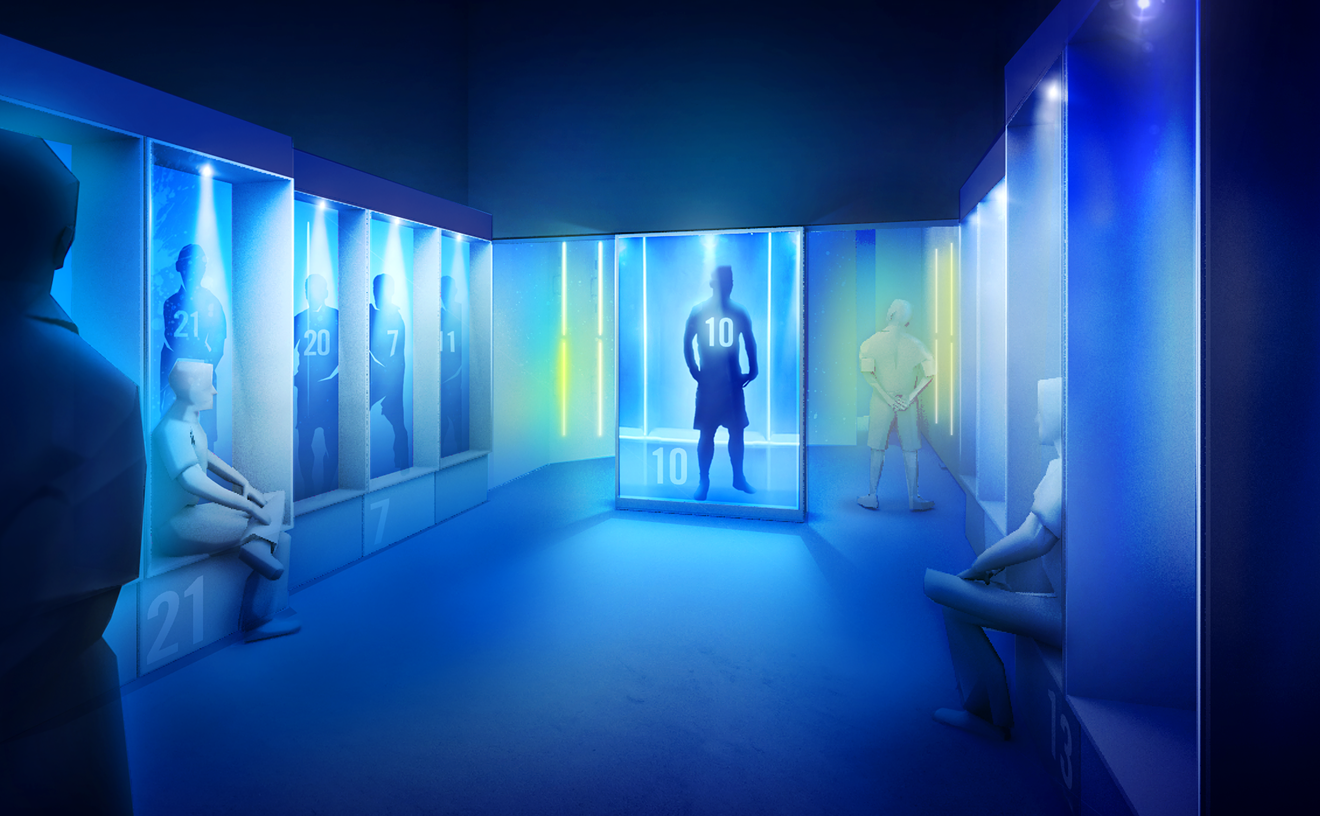"You know when you're kind of hungover and tired and you don’t know what to do Sunday morning? You put Landline on," director Gillian Robespierre jokes. “That’s the goal with all the things I try to create.”
On the phone with New Times, Robespierre tells the story of a D.C. screening at which a woman approached her to say she that loved Landline but that she rewatches Robespierre's first film, Obvious Child, constantly. “She said she watches it once a month just for fun and that it got her through a pretty bad time. The highest compliment isn’t that they watch your movie once, but that they rewatch it and it feels like something to snuggle with. We really wanted to make it feel like a warm hug or blanket.”
As comforting as they both are, Landline is a very different film from Obvious Child. Landline is about two sisters in the 1990s who discover their father is having an affair. It’s a bittersweet film that spreads focus to a number of talented actors rather than sticking with solely one character: Jenny Slate, Abby Quinn, Edie Falco, and John Turturro play the family of four.
“We really didn’t want to make another Obvious Child,” Robespierre says. “We wanted to all grow as artists, so we went back to our holes, our apartments, and Liz [Elisabeth Holm, Robespierre's co-writer and producer] and I brainstormed on where we wanted to take Jenny next. We wrote this movie with her in mind to play Dana, and it was like, What kind of fun adventure and challenge can we bring this amazing actor? So we created a character that’s a real character instead of Obvious Child, where it was a little closer to Jenny herself because we wrote Donna to be a standup comedian.”
Working with and challenging talented actors is something Robespierre loves. “She’s a national treasure,” she says of Edie Falco. “And it was so nice to have an ensemble cast and work with different styles. That opened up so much for me as a director, working with John Turturro, Edie Falco, and then Abby Quinn, who has only made three movies and has only ever worked with female directors.”
Of Quinn, who plays Slate’s younger sister in Landline, the director adds, “People write and talk about her because she had to come into this world of really tough actors. She’s an amazing breakout [star], and they’re pretty intimidating! What was great about her chemistry with Jenny was that it really opened up this movie.
“We always knew this was going to be a movie about a family growing together instead of apart through divorce, but what we didn’t really know was that we had this love story between these two sisters. That really came out through shooting the movie and sitting in the edit and realizing that Jenny and Abby were the focal point of this movie.”
After discussing other films about sisterhood, including her love for director Catherine Breillat's 2001 movie Fat Girl and the sisterhood dynamic at play there, Robespierre reveals that none of the sisters' relationships in Landline came from experience. Neither she nor Holm has sisters. “We have older brothers, and that relationship is so different from a sister relationship,” Robespierre explains. “When both of our parents divorced when we were teenagers, our brothers became, for the first time ever, our friends. We bonded over the restructuring of our family, so that was the thesis of what we were going for.
“But I think we were sort of mirroring our relationship: two women who met late in life at a film mixer,” she admits. “I didn’t think I’d have any more friends, but we had an instant chemistry, and that’s the closest thing we’ve had to sisterhood in our lives. We took all these relationships we’ve had with other women and put them into this movie.”
Landline's exploration of relationships between women doesn't stop at sisters. “We also dipped our toes into the mother/daughter relationship in Obvious Child, and we wanted to expand on that. It’s one of the most important relationships in your life, so we wanted to open that up and show its complexities and messiness. And we really wanted a scene with three women on a bathroom floor smoking cigarettes,” she laughs.
Many moments in Landline, including a scene in which Slate, Quinn, and Falco sit together on a bathroom floor and smoke cigarettes together after crying, straddle the line between melancholy and hilarity. Of this balance, Robespierre says, “It’s essential! In my real life, when I’m having a bad time or there’s a tragedy, there’s always comedy right around the corner. There’s always a laugh to break the heaviness. We just want to take that moment from our real lives and translate it into our piece.”
And there's plenty of heaviness to break. Landline's characters engage in affairs, take drugs, and sometimes treat one another with the coldness of strangers. But Robespierre and Holm aren't here to judge.
“One of the jumping-off points Liz and I had when we started writing about this family was that each member was struggling when we met them, as we as humans are often flawed and make really poor decisions,” she explains. “But we didn’t want to punish any of them! They’re choices that we often make... We never wanted to blatantly make a character likable; we wanted to make the character relatable.”
One of the biggest things that sets Landline apart from Obvious Child is its time period: the '90s. Rather than go for a pastiche of '90s comedies, all of which are very brightly shot, Robespierre and her crew created a lived-in world by referencing films from the 1970s instead, such as Paul Mazursky’s An Unmarried Woman. There’s no cheap nostalgia even though there are amusing moments that feel of-the-period, such as one where Falco’s mother watches Hillary Clinton giving her most famous speech on television and loves her suit so much she goes out to buy it.
“It was really meant to be a punch line, and Edie’s character and Hillary’s life sort of parallel with both of them being these strong matriarchs with high-powered jobs who hold in secrets,” Robespierre says. “We thought it’d be something that tickled people because she was going to be our president once the movie came out, and the tables sure did turn on us. The scene has a newfound heaviness due to the election. People will belly-laugh at that moment, but then you hear a sigh.”
Music from the '70s, '80s, and '90s, including Steve Winwood’s “Higher Love” and Donna Summer’s “Dim All the Lights,” populate the film, along with modern songs. The soundtrack enhances the shift between amusing and heartbreaking. Robespierre jokes that a lot of it was “dad rock,” songs she says, “I fucking hated as a kid that I now listen to. Paul Simon was something I was forced to listen to when I was little, and obviously I’m a huge fan of him now. I just remember thinking it was boring music and then rediscovering it in my 20s and 30s and thinking, Wow, my dad really did have good taste!”
But the one thing that brings together Landline's bittersweet wonder and true '90s realness is a restaurant every family that lived through the decade knows well: Benihana.
“Benihana was definitely, for a lot of families in the '80s and '90s, the fun restaurant to go to on birthdays and graduations. We’ve got Polaroids from '86 to '96, and it was a big deal,” she laughs. “And we’re coming into this chapter where Benihana is no longer this family’s exciting place.
“They’re all sort of stuck, and we wanted to use it more than once to show that there really is hope in Benihana, that their family will again become something important and safe and exciting to have. But they needed to go through a lifetime of problems to talk about to get back to that happy place. It may not last, as it often doesn’t, but family will always be there for each other. And so will Benihana.”
Landline. Opens July 28 at AMC Sunset 24, AMC Aventura 24, Regal South Beach Stadium 18, and O Cinema Wynwood. A special free screening as part of the Miami Jewish Film Festival takes place at 8 p.m. Tuesday, July 25, at the Bill Cosford Cinema. O Cinema Wynwood will also have an early screening at 6 p.m. Thursday, July 27, as part of the series OMG! Dinner and a Movie. Tickets cost $55 for the full package via o-cinema.org.
[
{
"name": "Air - MediumRectangle - Inline Content - Mobile Display Size",
"component": "19274298",
"insertPoint": "2",
"requiredCountToDisplay": "2"
},{
"name": "Editor Picks",
"component": "17482312",
"insertPoint": "4",
"requiredCountToDisplay": "1"
},{
"name": "Inline Links",
"component": "18711090",
"insertPoint": "8th",
"startingPoint": 8,
"requiredCountToDisplay": "7",
"maxInsertions": 25
},{
"name": "Air - MediumRectangle - Combo - Inline Content",
"component": "17482310",
"insertPoint": "8th",
"startingPoint": 8,
"requiredCountToDisplay": "7",
"maxInsertions": 25
},{
"name": "Inline Links",
"component": "18711090",
"insertPoint": "8th",
"startingPoint": 12,
"requiredCountToDisplay": "11",
"maxInsertions": 25
},{
"name": "Air - Leaderboard Tower - Combo - Inline Content",
"component": "17482313",
"insertPoint": "8th",
"startingPoint": 12,
"requiredCountToDisplay": "11",
"maxInsertions": 25
}
]














